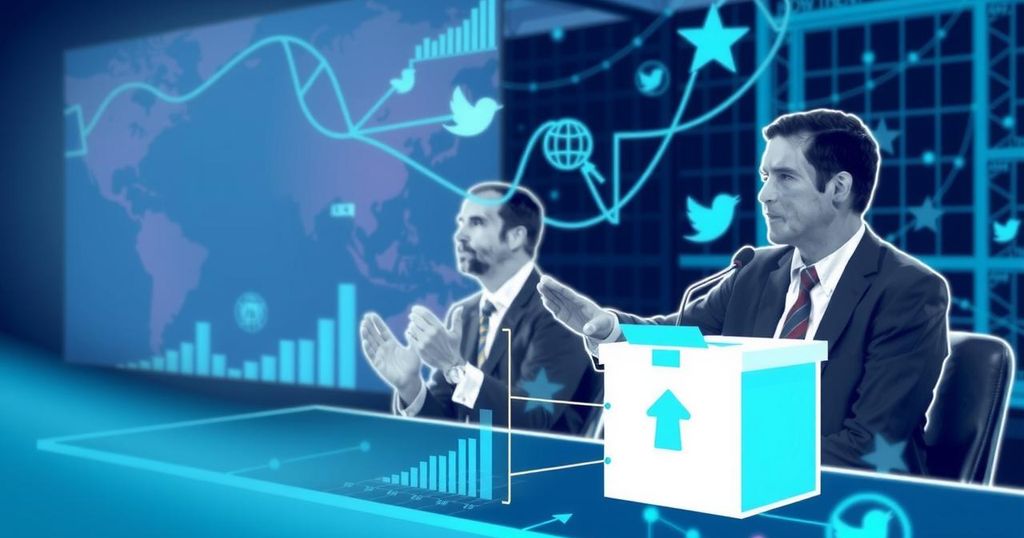Election Integrity in the Digital Age: Insights from IGF 2024

At IGF 2024, experts discussed the risks to election integrity posed by misinformation and advanced technologies such as AI and deepfakes. With over 65 elections occurring globally in a ‘super election year,’ the need for collaborative, multistakeholder solutions was emphasized. Discussions highlighted the dangers of digital inequality and the accountability of tech companies, underlining the necessity of ongoing efforts to safeguard democracy.
The Internet Governance Forum (IGF) 2024 witnessed a critical discourse on election integrity and the rising tide of misinformation amid the digital revolution. Industry experts convened for a session titled ‘Internet governance and elections: maximising the potential for trust and addressing risks,’ where they expressed concerns about the pervasive risks posed by misrepresentation and advanced technologies, particularly artificial intelligence and deepfake content. With over 65 elections set to take place globally in this unprecedented ‘super election year,’ participants asserted that the threat of deception is at an all-time high, necessitating concerted multistakeholder collaboration to safeguard democratic processes.
Tawfik Jelassi from UNESCO acknowledged the alarming acceleration of disinformation, asserting that, “Without facts, there is no trust, and without trust, democracy falters.” He highlighted that misinformation propagates at a rate tenfold that of verified information, intensifying skepticism surrounding electoral integrity. Panelists William Bird of Media Monitoring Africa and Lina Viltrakiene from the Lithuanian government noted the advent of sophisticated tactics used by malevolent entities to mislead voters, citing the growing prevalence of deepfakes and coordinated misinformation campaigns.
The panel also addressed the discrepancies in digital access across global landscapes, particularly focusing on the Global South as highlighted by Elizabeth Orembo of ICT Africa. She emphasized the heightened susceptibility of these populations to misinformation, attributing this vulnerability to digital divides and inadequate media accessibility. Orembo remarked, “We cannot apply blanket policies from tech companies without addressing regional contexts,” underscoring the necessity for customized strategies that consider infrastructural and cultural variances.
Sezen Yesil of Meta elaborated on the strategies employed by the company to mitigate election-related threats, including enhanced measures against fraudulent accounts and increased transparency for political advertising. While acknowledging the ongoing challenges posed by AI-driven disinformation, she noted a relatively contained impact of generative AI in the forthcoming elections. Calls were made for reinforced accountability standards for technology firms, with Viltrakiene advocating for robust legal structures similar to the European Union’s Digital Services Act to effectively address online harms.
The session underscored the imperative of multistakeholder collaboration across various sectors to uphold democratic integrity. Rosemary Sinclair from Australia’s AUDA identified the defense of democracy as a collective endeavor, necessitating joint involvement from governmental bodies, civil society, academia, and the technical sector. She stated, “The IGF is the ideal space for fostering such cooperation,” emphasizing the need for enhanced coordination between national and global IGF forums.
Participants concluded that the commitment to upholding election integrity must transcend isolated election periods. Continuous efforts from digital platforms, government entities, and civil society are critical in building lasting trust, tackling digital inequalities, and formulating protective frameworks in the digital sphere. The IGF’s pivotal role as a global dialogue and action platform received affirmation, with an encouragement to amplify its capacity in shaping future governance frameworks.
The emphasis on election integrity has gained prominence in light of increasing instances of misinformation and technological advancements that threaten democratic discourse. The Internet Governance Forum (IGF) serves as a critical venue for stakeholders in technology, governance, and civil society to address such pressing issues. In 2024, with numerous elections scheduled, the urgency to create strategies to combat misinformation has intensified.
The discussions at the IGF 2024 highlighted the pressing challenges that digital misinformation and technology pose to election integrity. Experts advocated for proactive multistakeholder solutions to address these challenges, stressing the importance of tailored approaches to diverse regional contexts. Continuous commitment to building trust and equitable digital access is crucial for protecting democratic processes in the future.
Original Source: dig.watch







